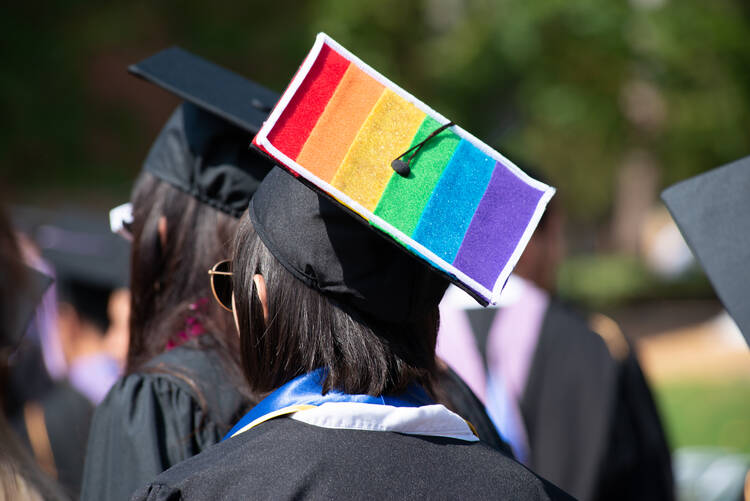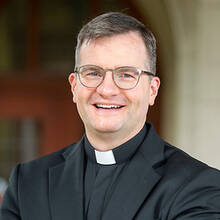Some recent controversies at the University of Notre Dame, where I work as a residence hall rector, lead me to share some reflections on moral disagreement in the setting of a Catholic university. Permit me two stories from my ministry at Notre Dame over the years, both involving gay students.
Casual indifference to language and inattention to others’ experiences and dignity might be terribly, sinfully harmful. We had to do better.
A few years back, the Division of Student Affairs invited someone to talk to staff members about his experience as a gay student at Notre Dame. The young man was poised, confident and eloquent. He told us how growing up and experiencing same-sex attraction in a small town in the Midwest was lonely, and how he had come to Notre Dame with hopes that he would find a larger, more sophisticated community in which to come to know himself and his way in the world. What he found on that first weekend, he told us, was the worst weekend of his life: In a place he had hoped to be friendly and hospitable, students were quick to call anything objectionably out of the ordinary “gay,” and any guy acting in any way out of line was subjected to various anti-gay slurs.
This was eye-opening for many of us. Another rector and I set about to create a training session for all of our orientation weekend staffers to alert them to the danger that this story pointed out: Casual indifference to language and inattention to others’ experiences and dignity might be terribly, sinfully harmful. We had to do better.
Around that same time, a first-year student stopped by one morning for coffee and to ask me some questions about life. He wanted to know how to deal with a situation in which his significant other (whom he referred to in gender-neutral terms) was not ready to be physically intimate.
“What I’m saying is, it’s hard to be gay and Catholic, Father,” he eventually said.
“What I’m saying is, it’s hard to be gay and Catholic, Father.”
“Well, I can understand that. But let’s maybe slow down,” I replied. “So you’ve decided the church is wrong about whether you can ever have sex with a member of the same sex. O.K., so when should you have sex with someone? You’ve only been here a few weeks. We have attractive, well-adjusted seniors, men and women, straight and gay, who have yet to have sex. They’re O.K.! You’ll be O.K. My advice is, don’t worry about having sex until you’ve figured out not just what you think is wrong but what you think is right. I think the church is right, but we can keep talking and you’re welcome here despite our disagreement.”
That student and I maintained a very good relationship for the rest of our time on campus together, and he wrote me a touching farewell note about our walking together in faith and life here. He did this despite my commending church teaching to him, and despite his rejecting it (so far as I know). I did, and do, think very highly of him.
“I think the church is right, but we can keep talking and you’re welcome here despite our disagreement.”
These two anecdotes have been prominently in my mind as the pages of our campus newspapers have roiled with talk of hate speech and bigotry because the editor in chief of The Irish Rover, Mary Frances Myler, wrote a column in which she called for more clarity from Notre Dame on where it stands with respect to church teaching and human sexuality. She wrote from a perspective endorsing that teaching.
So far as I could see, Ms. Myler said nothing contrary to the dignity of L.G.B.T. students, and she certainly seemed to be embracing “the recognition that students who experience same-sex attraction are human beings created in the image of God and loved immeasurably by Him.” Yet her Rover column has been castigated as “hate speech,” specifically in a letter from a student that was published in another campus newspaper, The Observer.
I asked some students what they found hateful or bigoted in the Rover column. One answered that Ms. Myler “doesn’t think [L.G.B.T. students] should have sex.” Well, true. So teaches the church, and so argue some smart and talented gay Christian thinkers and writers like Eve Tushnet and Wesley Hill. They are not hateful or self-loathing. Moral disagreement is a fact of life, and at a university in particular, we must learn to live with it in love.
The church’s teaching on human sexuality is simple enough: Sex is a powerful dimension of the human person ordered toward procreation and the bonding of husband and wife, and expressions that willfully sever sex from its nature are immoral. It is a difficult teaching! Many straight people (though not all) and many gay people (though not all) reject it. But conforming to what “most people” think is an empty and inadequate way to form moral views. We must first find and serve God in the tangle of our wits and think for ourselves about where conscience and moral truth are. And we will not be unanimous in our conclusions.
Too often, many in the church have seemed to pay special attention to gay sex, ignoring the rigorous demands that chastity places on us all, gay and straight alike. To many L.G.B.T. people, this is a stiff-arm from the church, a sign of unwelcome, and has led to harrowing weekends like the one that the Notre Dame student shared with our Student Affairs group. We can and must do better to provide a loving welcome to every son and daughter of God we encounter and walk with them toward the truth together.
But we can also challenge one another without thinking that disagreement—even about very important things—is always an expression of moral failure, bigotry or hatred.
In the end, I find that few people make their decisions about sex solely based on anything I have said or thought. This is most understandable. When they ask my opinion, it is presumably because they want a presentation of the church’s teaching from someone they have come to trust, and because they also believe that dialogue and mutual accompaniment are possible. But to build and maintain such relationships, we need to fear one another a lot less and trust one another—and God—a lot more.







